Welcome to the live coverage of the General Assembly in WAHO Abu Dhabi 2025, sponsored by Rifat Arabians Australia.
We are now on the two-day General Assembly, so please enjoy this live feed as it happens.
5.35pm
That’s a wrap for today! I will be back here at 9am tomorrow UAE time with coverage of day two of the General Assembly. Tonight is a dinner and social event, and then we have the Gala to look forward to tomorrow night – at the seven star Emirates Palace Hotel!
I hope you have enjoyed this coverage. Please feel free to share on social media, and thanks once again to Rifat Arabians Australia for their support.
5.30pm
We snuck in one more – Brazil – which makes it 30 countries presented today; 26 to go tomorrow. Brazil is known around the world for their Arabian horse, and they have once major international show a year with many horses around the world descendants of champions of these bloodlines. The number of foals re bred a year and the number of breeders is decreasing. Breeders are being more selective about what they register, but the Association is working hard to make sure that horses have a role. They have invested strongly in social media.
They would like to share a concern – the true purpose of the Arabian horse. Many breeders are seeking the highest refinement possible, but are seeing horses with poor legs and weak functionality. They are worried we are breeding two different types of Arabian horses – we must not forget Arabian horses was made to be ridden. Strong words – and ones many agree with!
5.21pm
Now for Spain. They have a digital version of their stud book available, and breed around 500 foals a year. They also have an active social media. Spain organises a lot of educational activities a year, and they also work hard with genetic research. They have a busy programme ahead for 2025. The Spanish Arabian is a wonderful thing, and everyone is invited to visit! They end with a brief video for everyone to enjoy – it is beautiful, and lovely to see some Arabian horses.
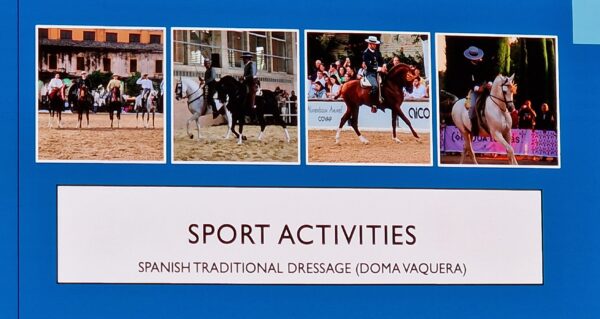
5.19pm
The next country is Jordan – who, of course, were hosts of the last WAHO Conference. In 2023, 200 foals were born in Jordan but only 87 last year.
5.14pm
We now move to Italy, which includes Sardinia. They have seen a rare increase in the number of foals born, with 835 in 2024 compared with 798 the year before.
5.10pm
Now for Iran, who breed over 800 foals a year, although there was a drop of 50 foals in 2024 from the previous year. They, too, will have a new stud book out this year. They try to encourage the preservation of Arabian horses of Iranian bloodlines. Embryo transfer is not allowed. There has been a huge increase in racing – and prize money – with the number of races doubling in the last year. They, too, thank HH Sheikh Mansour and the horse-loving country of the United Arab Emirates.
5.06pm
Hungary is next, who breed around 15 foals a year, with 17 born last year. Bábolna is one of the oldest Arabian State Studs in Europe, and this is their 50th anniversary of being a member of WAHO. Stud books go back more than 235 years, and there is an online database for all horse breeds including Arabian horses. Their horses are, as well as the usual disciplines, are also used for driving. The Arabian horse in Hungary is highly respected by many in the country.
5.03pm
Argentina is next to present. Founded in 1882 as a thoroughbred stud book, Arabian horses followed a few years later. They consistently breed around 200 Arabian foals a year. They have offered help to Arabian horse countries in South America with their registrations – such is the spirit of WAHO!
5.01pm
Croatia is next, where 10 foals were bred in 2024, 13 in 2023. They have 241 registered Arabian horses in Croatia. Embryo transfer is allowed but they don’t use it. Their last stud book was in 2021, with the next book out this year both electronically and in print. They thank all the foreign stud book authorities for their co-operation, plus Katrina.
4.56pm
Kazakhstan are the next country to present, having joined WAHO in 2022. Around 8 foals a year are bred in Kazakhstan. This year, HH Sheikh Mansour has gifted two mares , and it is hoped that this will improve breeding within the country.
4.51pm
Lithuania is next to present. This is a very small registry but they saw double the number of foals born in 2024 – 8 compared to 4 in the previous year. All the state-owned horses have been sold to private breeders in the past few years. While they are not huge in numbers, the Arabian horse in Lithuania is recognised for its qualities. 20% of the Arabian horse population there competes in endurance, with some also competing in dressage. They, too, will have a stud book out this year, and much of it is online.
4.48pm
Libya is next, who breed around 100 foals a year. They have a National Centre of the Arabian Horse, which has enabled them to get public support. It has been a quantum leap for them and they thank Katrina for her help in getting this up and running.
They, too, have over 100 race horses per year, and they are organising Arabian horse events in all Libyan regions.
4.42pm
On to Iraq. They have elected to speak in English and they share an interesting insight into Arabian horse breeding in the country. Like many, they have a new stud book coming out this year. They don’t export from Iraq, but they do import. They have 312 imported horses for racing and for show, with horse shows on the rise in the country.
They have around 100 races over 10 months of the year, stopping in July and August because of the weather. It is all locally funded by business people. The horse shows can be found all over the country, some under ECAHO as well as local shows. Again, they have endurance – generally ex-racehorses. There are around 1,500 horses registered in the stud book, including 90 stallions.
Despite difficulties within the country, they have continued with registrations and thank the WAHO Office for their help.
4.37pm
The Czech Republic is next, which breeds a very small number of foals a year: 19 in 2023 and 14 in 2024. They have almost 200 members and 450 Arabian horses. They hope that their stud book will be online by next year. Again, they thanked the WAHO Office for their help with registrations – Katrina and Joanna do a wonderful job, and it is good to see them acknowledged by so many.
4.34pm
Kuwait breeds a lot of foals, around 800 last year, and they are known globally for their straight Egyptian Arabians.
4.31pm
We are straight onto Tunisia, who breed around 500 foals a year. The first stud book, released in 1956, with volume 15 to be published this year. All their stud books are online. They export a lot of horses, with racing and endurance being the primary sources of showcasing the breed. They hold over 350 races a year, plus four horse shows. An interesting insight into the Arabian in Tunisia. Kuwait next.
4.28pm
Egypt opens with a thank you to everyone involved with the conference. Egypt is well known the world over for their beautiful Arabian horses and the Royal Agricultural Association is dedicated to preserving this bloodline.
Each year, they breed over 2,000 foals, and they look forward to the future.
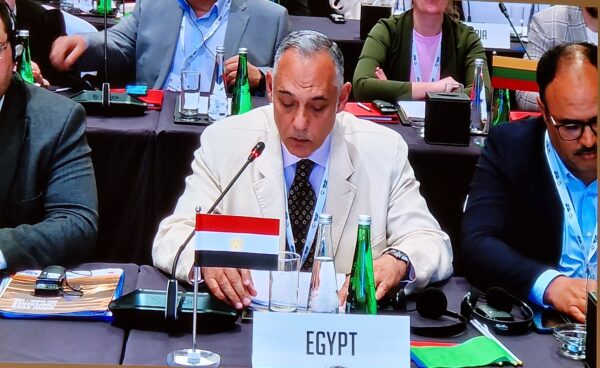
4.27pm
Peter has just returned to the room and it looks as though we are ready to go with more registry reports. As I mentioned before, during the breaks the Executive Committee have a lot of work to do and sometimes, these things can take longer than planned.
We will return to the reports with Egypt.
3.38pm
Break time – we will be back in half an hour! We have had 15 of 56 registry reports thus far, so we will definitely be finishing these tomorrow morning before we continue with conference business.
3.34pm
Turkey is the last to go before the break, which will be 30 minutes. Again, a drop in foal registrations, from 1,946 in 2023 to 1,733 in 2024.
3.27pm
Germany is the next country to report. They have seen a big drop from 403 foals in 2023 to 300 in 2024. They, too, have an online stud book/database.
3.16pm
The United States is next – goodness, it is hard to hear a voice that isn’t Deb’s. She was such a vibrant character, not only at WAHO but at all Arabian horse events. Bruce Johnson is here for the first time, and he acknowledges the sad loss of Deb. Beautifully done.
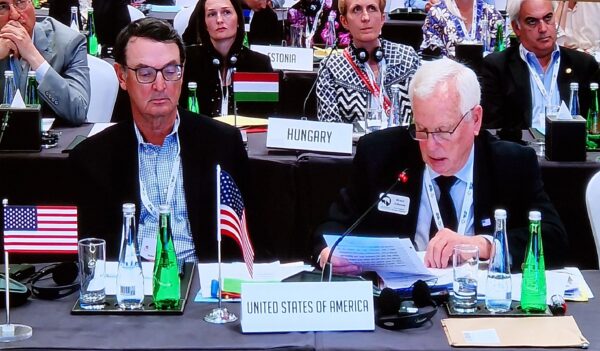
The United States numbers include those bred in Mexico. They, too, have seen a reduction in foals born. The AHA is offering an amnesty for those with Arabian horses over two-years old to register them for a reduced price. They have had 186 applications as part of this amnesty, with two breeders sending in over 20 registrations!
The AHA stud book is all online at Datasource – and they add all show, racing, and endurance awards to Datasource, making it a great resource for researchers. They, too, are looking to bring in online registrations.
There were 226 Arabian horse shows in the US last year – with 19% of the active population of purebred Arabian horses shown. That’s quite an interesting statistic; I wonder what it is in each country?
The WAHO Trophy was not awarded in 2024 – I wonder why? They have so many brilliant Arabians to choose from, from halter, racing, endurance, western, and more. Hopefully, there will be a WAHO Trophy winner for 2025.
3.12pm
It is now the turn of Morocco, which is in Arabic and has everyone reaching for their headphones! A full quota of translators are always available at the conferences to ensure that everyone understands the General Assembly in their own language.
Morocco is about to produce its 12th stud book; like many countries, foals born last year are down, 734 compared with 843 in 2023.
3.06pm
Now it is the turn of Austria. As with all the countries, HH Sheikh Mansour and the organising committee are being thanked for this incredible conference.
Austria bred just 69 Arabian foals last year, with many breeders retiring and the economic situation continuing to cause problems the world over.
Austria now has an online stud book too – hurrah!
2.59pm
The Kingdom of Saudi Arabia is next, and they have a video by way of review. They breed an extraordinary number of foals this year – 6,608 in 2024, up from 5,058 in 2023. That is probably the same number as all the European countries put together!
They are currently preparing their 101st stud book. All their registration process is online, which makes it easy for the registry to generate data. They have 60,942 Arabian horses in the country – across 18,605 owners. They also have 108 shows. Quite incredible!
The KAAHC is active on all social media platforms to raise awareness of the Arabian horse. All in all, a very forward-thinking and inspiring display, with the heritage of the Arabian horse at the heart.
I wonder whether they will be the next WAHO Conference location, after all?
2.53pm
The Belgian Arabian Horse Registry is next – whose stud book is also online. Breeding numbers in Belgium remain consistent. They have many training centres based in Belgium as well as breeding stallions standing in the country. Belgium has a high number of exports, and this is partly why.
2.51pm
It is now the turn of Qatar. They breed close to a thousand horses a year. Qatar also has an online stud book, and they are committed to high standards and excellence within the Arabian breed.
2.45pm
It is no surprise that France has a huge racing scene, and also a large number of horse shows. They, too, have seen a drop in foals in 2024. They also have many horses competing in endurance.
France is very focused on the welfare of horses ,with embryo transfer being just one area they look at.
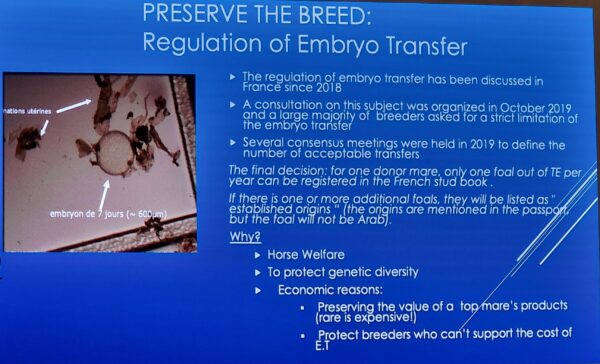
2.38pm
Our host nation, the United Arab Emirates, was next and, unsurprisingly given the increase in shows and growth in the region, they have seen a large increase in the number of foals, born.
France is next.
2.33pm
Now is the turn of Poland. They allow three foals from a mare per year via embryo transfer – but with the stipulation that the recipient mare is an Arabian mare to ensure that the characteristics of the breed learned through nuture are passed onto the foals.
As well as the usual ways of promoting the breed, Poland also promotes the Arabian horse through its art – you can read some features on Polish artists here.
2.30pm
Volume 9 of the Omani Stud Book has been issued, and they have an increase in the number of foals born in 2024, 259 against 225 in 2023. Katrina Murray had a special mention – a theme that will be repeated over the course of these talks, I am sure. She does so much for WAHO and the Arabian breed, and surely deserves the Arabian equivalent of a damehood!
2.23pm
Australia is next, who has been faced with an array of natural disasters since the 2019 conference. That, on top of Covid, has affected the number of registrations and membership numbers.
Their last printed stud book was in 2001 – it is now all online and I can attest that it is a wonderful resource! I wish that more countries did an online stud book as it truly helps with researching.
Australia is also a caretaker stud book for several other countries – Brunei, India, Indonesia, Malaysia, The Philippines, Singapore, South Korea, Thailand, and Vietnam.
Oman next.
2.19pm
By comparison, Bahrain have bred just 16 foals less in the last year – 203 in 2024 vs 219 in 2023.
It is only recently that the use of artificial insemination has been allowed in Bahrain, and the number of exports show that the Arabian horses being bred in Bahrain still have a significant place on the global stage.
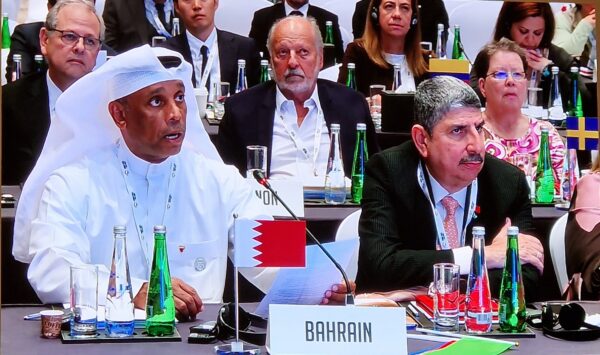
2.15pm
The UK explains that foal numbers are down – primarily due to the sad loss of a number of big breeders but also because of Brexit and bureaucracy on both sides of the channel. As someone who has been directly impacted by Brexit with my own print magazine, I understand some of these frustrations.
Looking at the handout, just 136 foals were bred/registered in 2024 compared with 213 in 2023. A significant drop.
CF Zinnia, bred by Michael Harris of Combe Farm Arabians, is the 2025 WAHO Trophy winner for the UK.
Bahrain is next.
2.14pm
The first of the 56 delegate reports is from the United Kingdom. Go Karin! This part always feels a little like Eurovision, which I love. We are just waiting for a video to load.
2.12pm
One of the big questions of the conference – other than where will the next one be – is what time and where do the buses go from? We have just had a full run down on buses so hopefully that is all of those questions answered for now!
2.05pm
First things first, some admin for the running of the afternoon/the rest of today. This is all about the reports from the voting delegate countries. They always offer a wonderful insight into Arabian horse breeding around the world.
2.04pm
And we are back!
12.44pm
Peter opens the floor for discussion – Bahrain wonders why we cannot apply categories for exports as there are for foals. Peter replies that they didn’t want to over complicate things.
The General Assembly will reconvene at 2pm.
12.40pm
The export fee will be £5 and with around 3,000 horses exported each year, this will help prevent WAHO going into a loss – which is essential to the future of this organisation.
There is no change to IAM – individual associate member – fees.
12.33pm
The final agenda item before lunch was to receive notice of the increases to various WAHO membership fees, effective 1 January 2026. Fees are only raised every six or seven years – they were last raised in 2019 at the Australia conference.
Money comes into WAHO through subscriptions, levies, donations, investments, and conferences.
The fee increase is necessary to meet rising costs.
While this is going on, Arabic tea and coffee is being brought around, reinforcing the wonderful Bedouin customs of the Middle East.
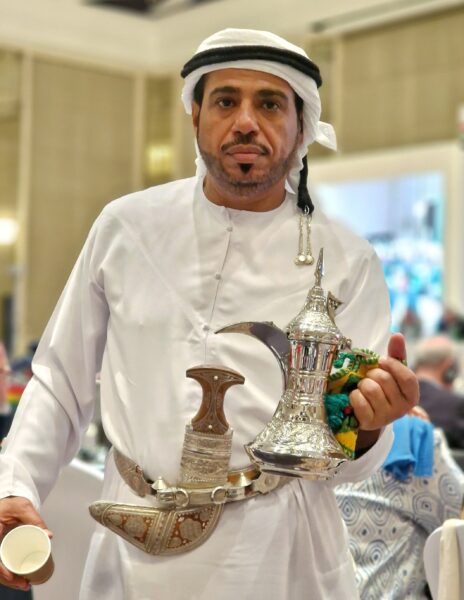
12.30pm
Caroline carried on with a vote to continue with the new accounts WAHO had moved to, Hazlewoods LLP of Cheltenham UK, who specialise in charities. UK proposed, Libya seconded. The motion was carried.
12.27pm
Income is down, leaving a modest gain in 2024 of £6,621 – down from £14,110, primarily due to falling interest rates. The charity reserves are doing well.
The treasurer, Caroline Sussex, thanks the WAHO office for keeping costs under strict control and keeping expenditure down.
The 2024 accounts were proposed by Switzerland and Czech Republic, and seconded by United States. The accounts were adopted by a clear majority.
12.21pm
Time for the treasurer’s report and accounts ending 31 December 2024.
12.15pm
The next amendment is now regarding the termination of membership, insofar as a registering authority reorganising their structure going forward, and WAHO not being confident in their ability to do the job. Peter explains that there have been incidents in the past when this has happened, and by changing the constitution, it gives WAHO a chance to terminate membership where necessary – such as stud books not being maintained, documents incorrect etc.
United States proposed, Pakistan seconded. The motion was passed.
12.11pm
The discussion continues, and Peter then puts the motion to vote…
The motion was passed with more than a two-third majority, which is needed to pass any WAHO motion.
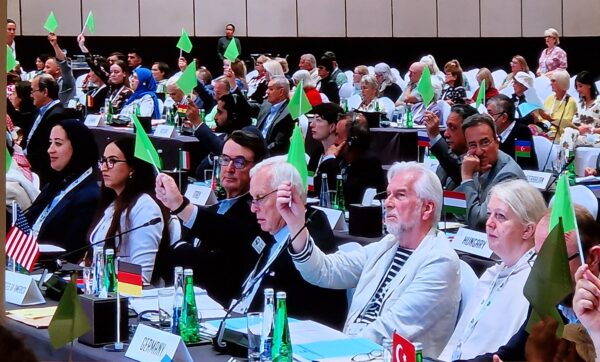
12.03pm
Czech Republic says that they support the motion, but would prefer to receive with more notice on the fee increase – which Katrina says that there is no vote on the fee increase, that it is a WAHO Executive Committee decision.
The Czech Republic adds that could an electronic export certificate be considered instead, that could also thus increase the amount coming to WAHO Peter says that they are happy to embrace new technology, and will look into it.
12.01pm
Peter says he has asked the Executive Committee to think about other ways to create income for WAHO. The export levy is the only other additional area they can think of.
11.58am
A point is raised by Bahrain that it will be the breeders paying these fees, not the registry. Peter says they are talking about a very small amount of money for each exported horse – I am not sure I can say the amount here, but it is less than £50 GBP.
11.51am
Peter opens the floor for discussion. The fee on exported horse is for WAHO to obtain some small income, due to decreasing number of foals being bred, especially in western countries. This is to help preserve the future of WAHO and the running of the charity.
Pakistan says that they think it is a good decision and they agree with it.
Peter adds that there are few avenues through which they can raise income – which is only needed to cover expenses.
11.48am
It is now time to consider and vote to update the wording of the WAHO constitution, which will be done using the flag system of green and red, or blue for abstention.
The clause in question is to do with finance. Much of it is fine details, such as subscription and levy to subscriptions and levies, but there wording on “in proportion to the number of horses of the Arabian breed exported in each year” is added in reference to such subscriptions and levies.
11.46am
Peter stresses the importance of all exports being recorded.
11.44am
A more complicated one now – all thanks to Brexit! The Irish, Greek and Maltese Arabian horses can no longer be registered to the British Stud Book. The Netherlands have been caretakers for the horses in Malta and Greece, and as of the break, they have agreed to take on the Irish Arabian horses as well. However, there are lot of hoops to jump through with the Irish Government, and the existing Irish Stud Books for other breeds refused to help.
The work for this will now begin, and will be reported back to at the next conference.
11.40am
Kazakhstan will act as the caretakers for the Arabian horses of Uzbekistan – Poland propose, Libya and Pakistan second the motion, which delegates passed. They are using flags for voting as you can see below.
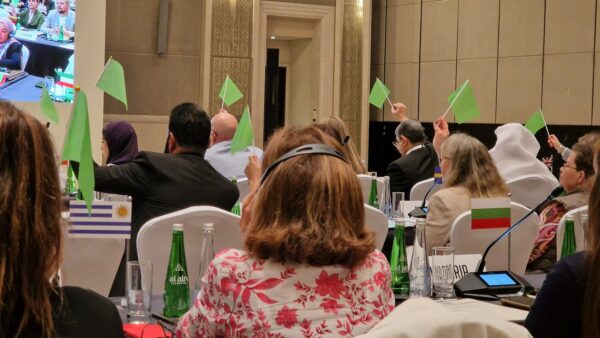
11.36am
The next caretaker country is Bolivia, who have offered to be caretaker for Paraguay. Brazil used to be the caretaker for this country, but this stopped in the 1990s.
Bolivia was contacted to see whether they could be caretakers and they agreed.This is a very new arrangement, but the Executive Committee would like to ask for approval now.
Czech Republic and United States propose and second the motion, which the delegates them pass.
11.33am
Zimbabwe will now be the caretaker for Botswana – Namibia and Denmark propose and second the motion. They are also caretakers for Zambia
Peter explains that there are number of situations around the world were numbers are too small to have their own registry, so a caretaker country is used until such a time the country can have their own.
11.31 am
We move to the applying member country, Ukraine – and their delegates are here, to much applause. Their stud book is currently being reviewed. They hope that their first WAHO approved stud book will be approved within the next month or so.
11.30 am
The People’s Republic of China are now fully registered members of WAHO, and their first WAHO approved stud book has been produced.
11.29 am
We have just stood in memory of all those who have passed since the last conference, many of whom were friends with so many of us here today.
11.25 am
Apologies for absence are received from Ecuador, Finland, New Zealand, Norway, Portugal, Serbia, Slovakia, and Venezuela, Due to visa issues, the Syrian delegates are also unable to join us.
Cuba and Yemen, applying member countries, did not respond to the invitation,
11.24 am
Those introductions are done, and Peter encourages the applause for their service to WAHO over the years.
Of course, he closes with the wonderful Katrina Murray, WAHO Executive Secretary since 1997. Her years of loyal service to WAHO are truly magnificent – a statement that is met with much applause.
Joanne Minter is also acknowledged, the Membership Secretary, who is back in the office holding the fort while the conference takes place.
11.16 am
Peter introduces the WAHO Executive Committee.
11.13 am
WAHO was first registered as a charity in the UK 55 years ago – a wonderful achievement!
The WAHO definition was agreed in the 1974 conference in Sweden, and it will never change. Regardless of conflict:
“A purebred Arabian horse is one that appears in any purebred studbook or register, listed by WAHO as acceptable.”
11.11 am
Peter reminds us that WAHO is a non-political organisation, and it brings together people across the world. Regardless of our background, we all share our mutual interest – the beautiful Arabian horse.
He continues, saying that many countries here are being affected by conflict. He hopes that there will an end to these conflicts. He is glad that there are so many are from affect countries and he thanks and welcomes them.
11.09 am
Peter particularly welcomes those countries who are new to WAHO and who have not been here before. The average for the number of countries at each conference is 30-36, but there are 56 countries here in Abu Dhabi, much of which is due to the generosity of HH Sheikh Mansour.
11.07 am
Peter calls everyone to order. He thanks everyone for taking time out of our busy lives to be here. It is his fifth WAHO as President.
He thanks the Organising Team for putting together such a wonderful schedule.
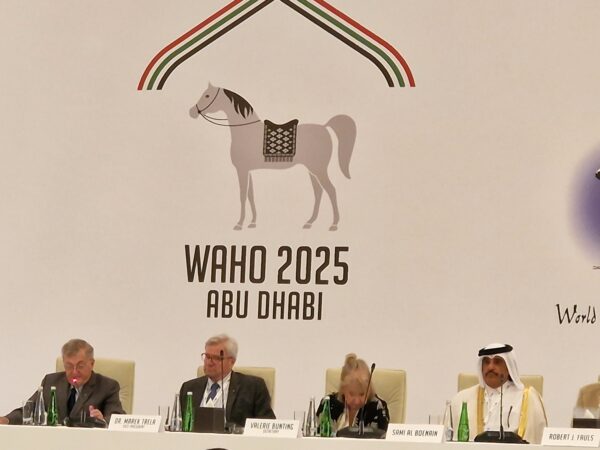
11.03 am
Next on the agenda will be convening the meeting, followed by an opening address by Peter Pond, the President of WAHO. The WAHO Executive Committee will be introduced, and then a minute’s silence in memory of those WAHO members who have passed away since the last conference. This is going to be very emotional, with the absence of Deb Fuentes particularly felt by those here.
11.01 am
We are back! The long breaks as as the Executive Committee still have business to discuss as the agenda progresses.
10.03 am
HH Sheikh Zayed is introduced to the WAHO Executive Committee, and personally speaks to each of them, which is a lovely touch. He then leaves with his thanks. A break follows.
9.58 am
HH Sheikh Zayed and his entourage are now preparing to leave the meeting, closing the welcome saying “May peace be among you.”
9.56 am
This the second time WAHO has been held in the United Arab Emirates. Peter adds that we are looking forward to seeing this vibrant country and horses.
9.54 am
It is now the turn of WAHO President, Peter Pond..
Peter opened with sharing his sincere gratitude on behalf of all gathered here today to HH Sheikh Mansour and HH Sheikh Zayed for their support of the WAHO Conference in Abu Dhabi and for being here today.
Peter closed with a quote from the late HH Sheikh Zayed, and then thanked the family once more.
9.52 am
The talk ended with sharing some of the horses that were exported to the United States, in particular Carl Raswan.
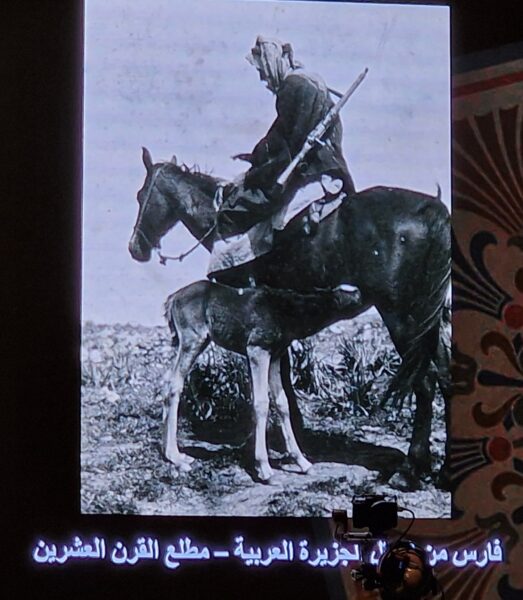
9.29am
Next is Mohammed Almatrooshi, a researcher in the field of Arabian horses.
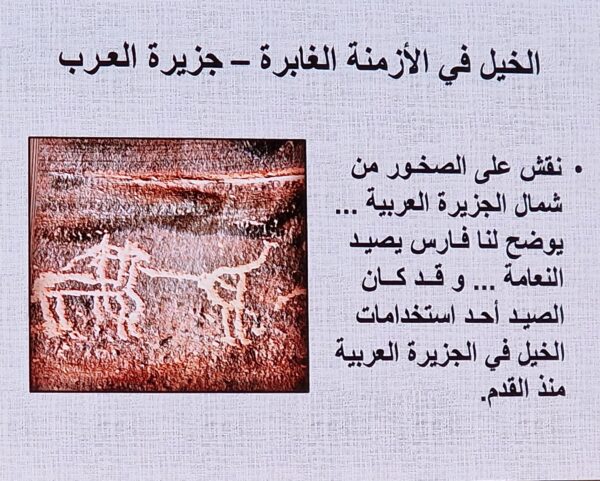
He says that since time immemorial, there has been a bond between Arabian horses and man. The image above shows an engraving found in the north of the Arabian Peninsula, a hunting scene where a rider on an Arabian horse is hunting an ostrich with an arrow.
The talk continued with a fascinating insight into the Arabian horse through history, looking at tribes and transactions, as well as engravings found over time.
9.16am
There follows at talk from Saeed Alsuwaidi, a research expert in national history and archives. he shared a collection of stories from the ruling family and sheikhs in the UAE.
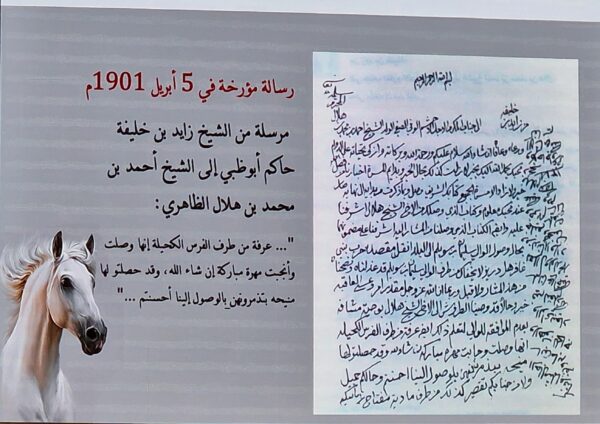
He explained that Arabian horses have been owned by rulers for many years, and that the most noble gift they could give each other was an Arabian horse. They had a skepticism of those who didn’t love poetry and Arabian horses, and the two are woven together through history.
Documentation as early as 1867 shows Arabian horses being given as gifts between rulers.
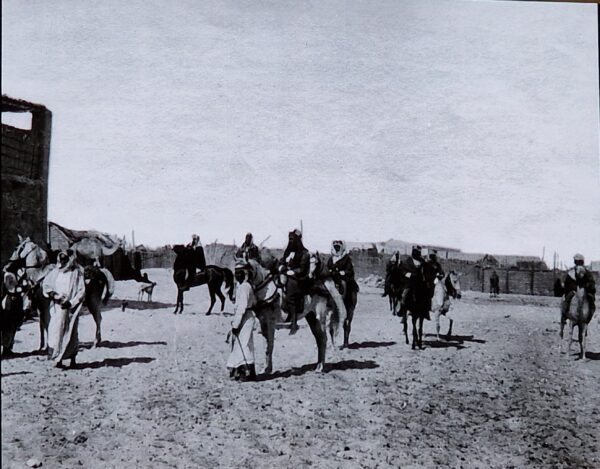
One of the oldest photos in the archives – above – shows Sheikh Zayed on the left, with his sons on horses, about to head on a pilgrimage. The photo is around the late 1800s.
Saeed also referenced the number of times women and horses are mentioned in the archives, and that there is a history of female horse riders. There are stories of women mounting their horses with gold jewellery and amazing robes, and he shared anecdotes of some of these/
9.14am
HH Sheikh Zayed bin Hamdan bin Zayed Al Nahyan speaks on behalf of HH Sheikh Mansour, saying it is an honour to welcome everyone to the UAE. This is an international event that gathers all lovers of the Arabian horse throughout the world to promote the breed to an international arena.
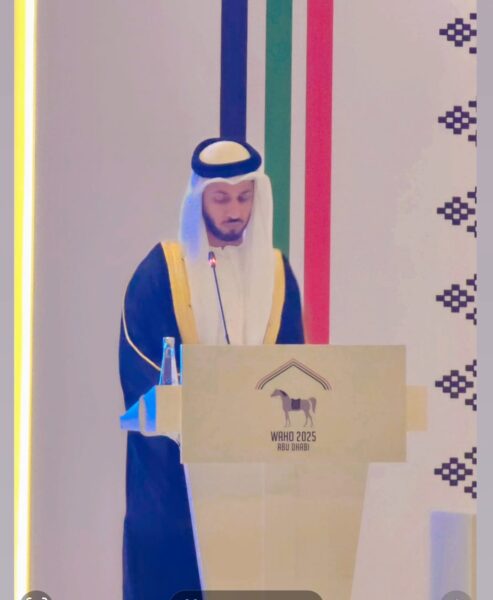
HH Sheikh Zayed continues, saying that throughout the conference, we look forward to moving forward between the countries, and to preserving the next generation of the Arabian horse. “May the peace of God be upon you all.”
9.12 am
The welcome continues, staying that this conference includes meetings talking about Arabian horses, breeding, and cultural visits. The conference being held here shows the interest given by different countries to the legacy of the Arabian horse.
WAHO being held here marks a milestone in the Emirates preserving the legacy of the breed. It promotes co-operation with all different countries throughout the world, as well as further advancement in the field.
9.10 am
A video is shown, emphasising that all the work of the Emirates Arabian Horse Society and Arabian horse breeders in the United Arab Emirates is guided by the vision of HH Sheikh Zayed, the founding father of the United Arab Emirates. There are now over 28,900 Arabian horses in the UAE, and the enduring spirit of the Arabian horse is as strong as ever.
9.08 am
The event began with a welcome from representatives of the ruling family, saying it is an honour to hold this WAHO Conference under the Patronage of HH Sheikh Mansour.


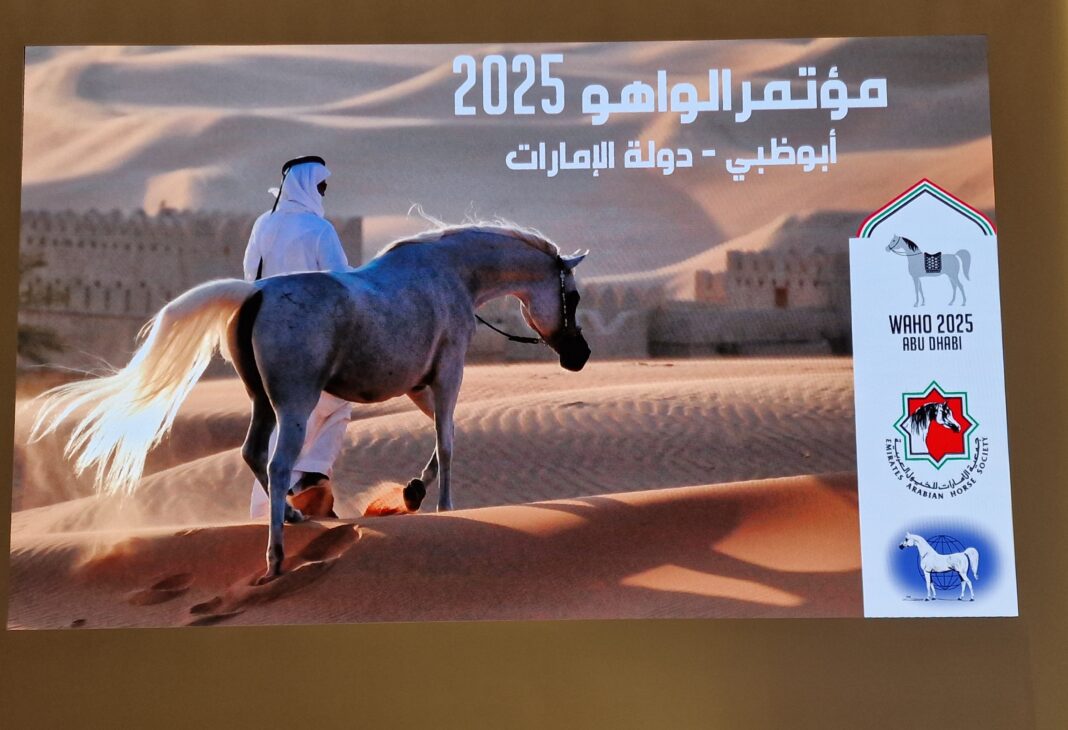
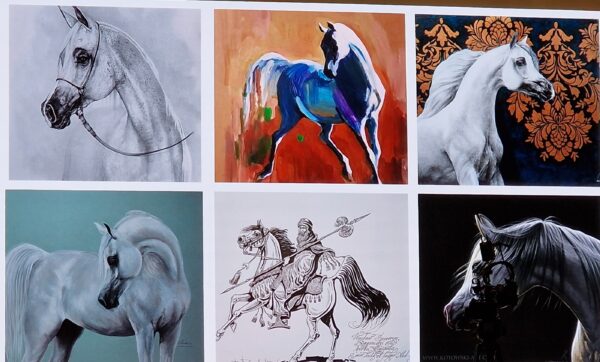









thank you, Samantha almost feel like there . Great coverage